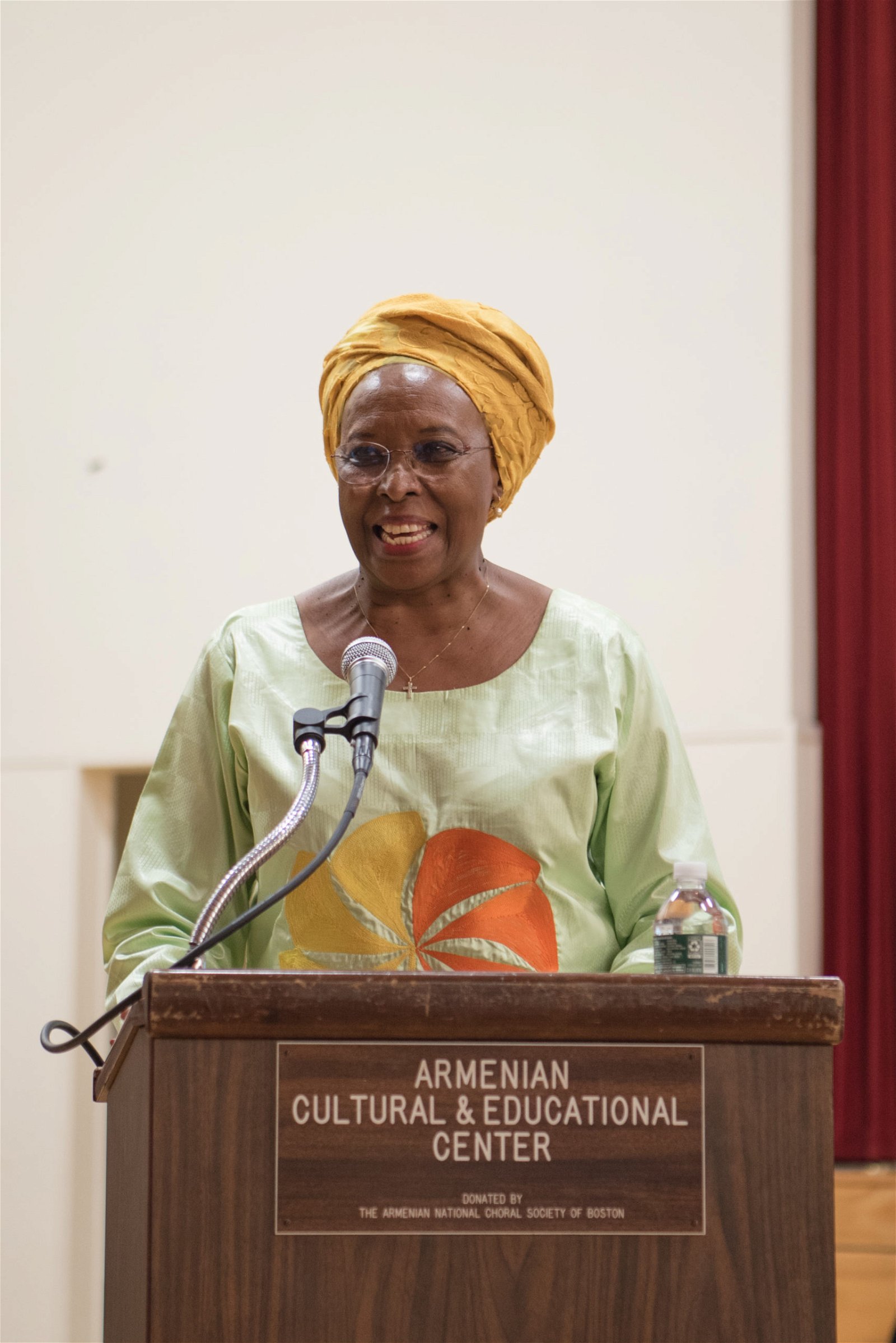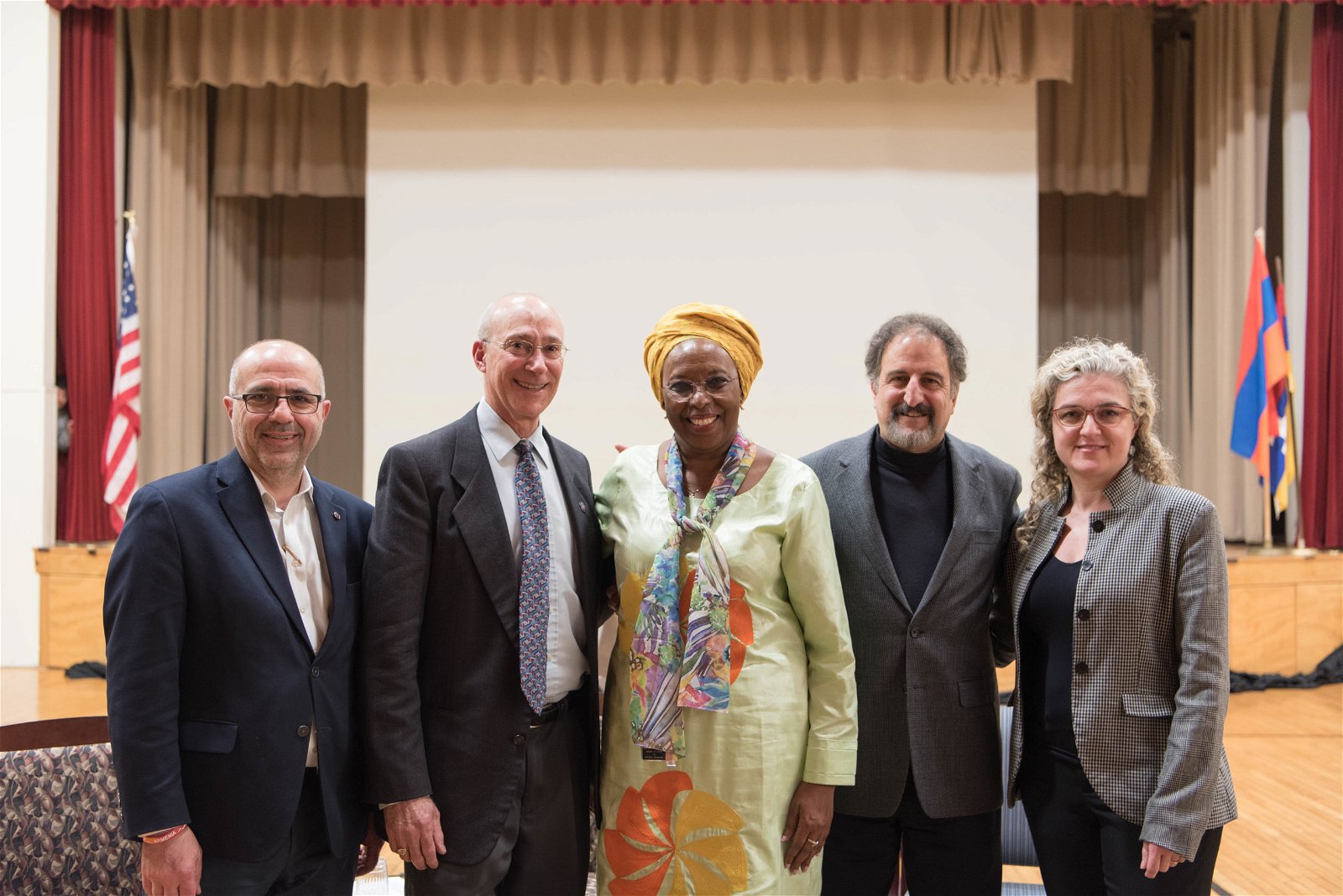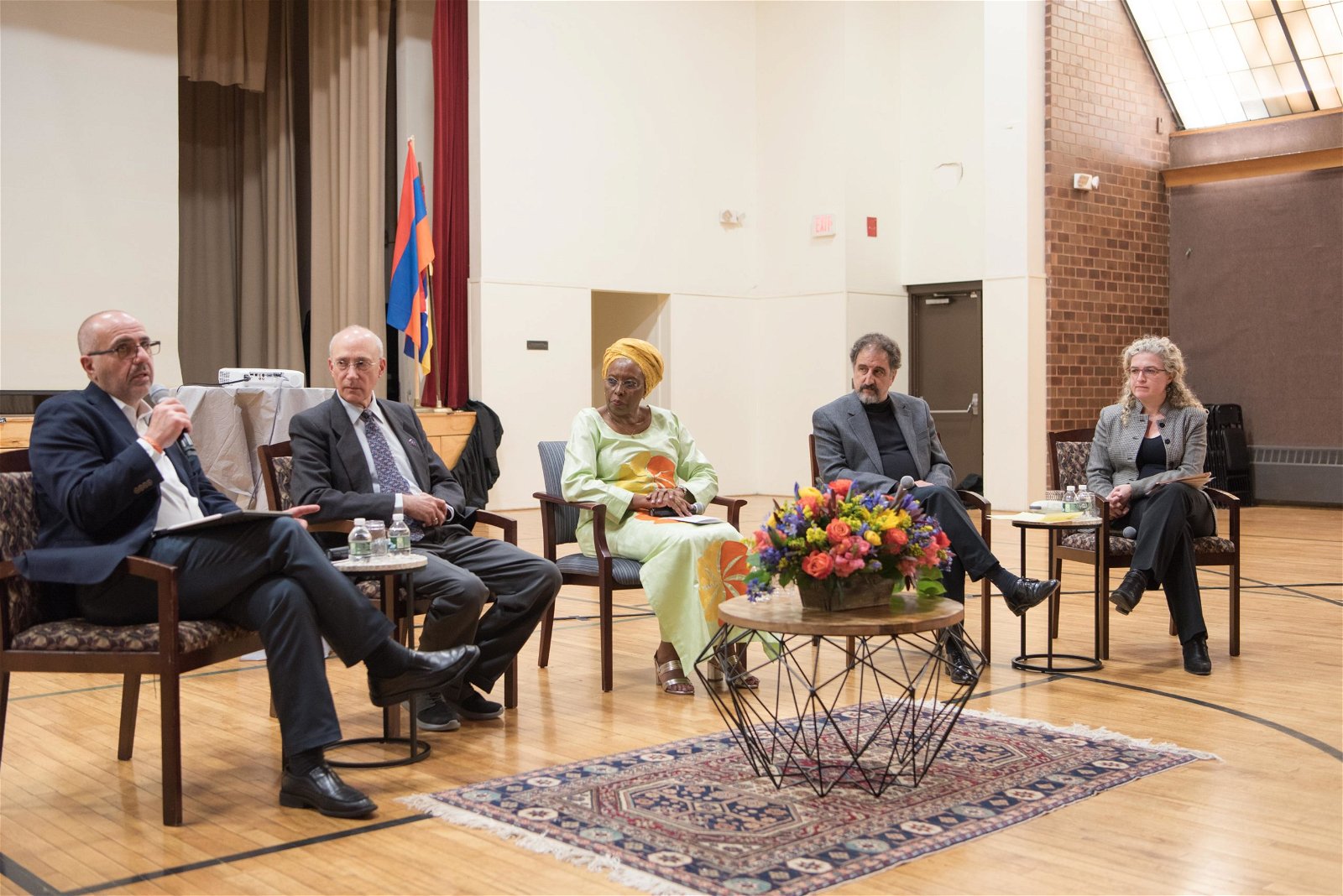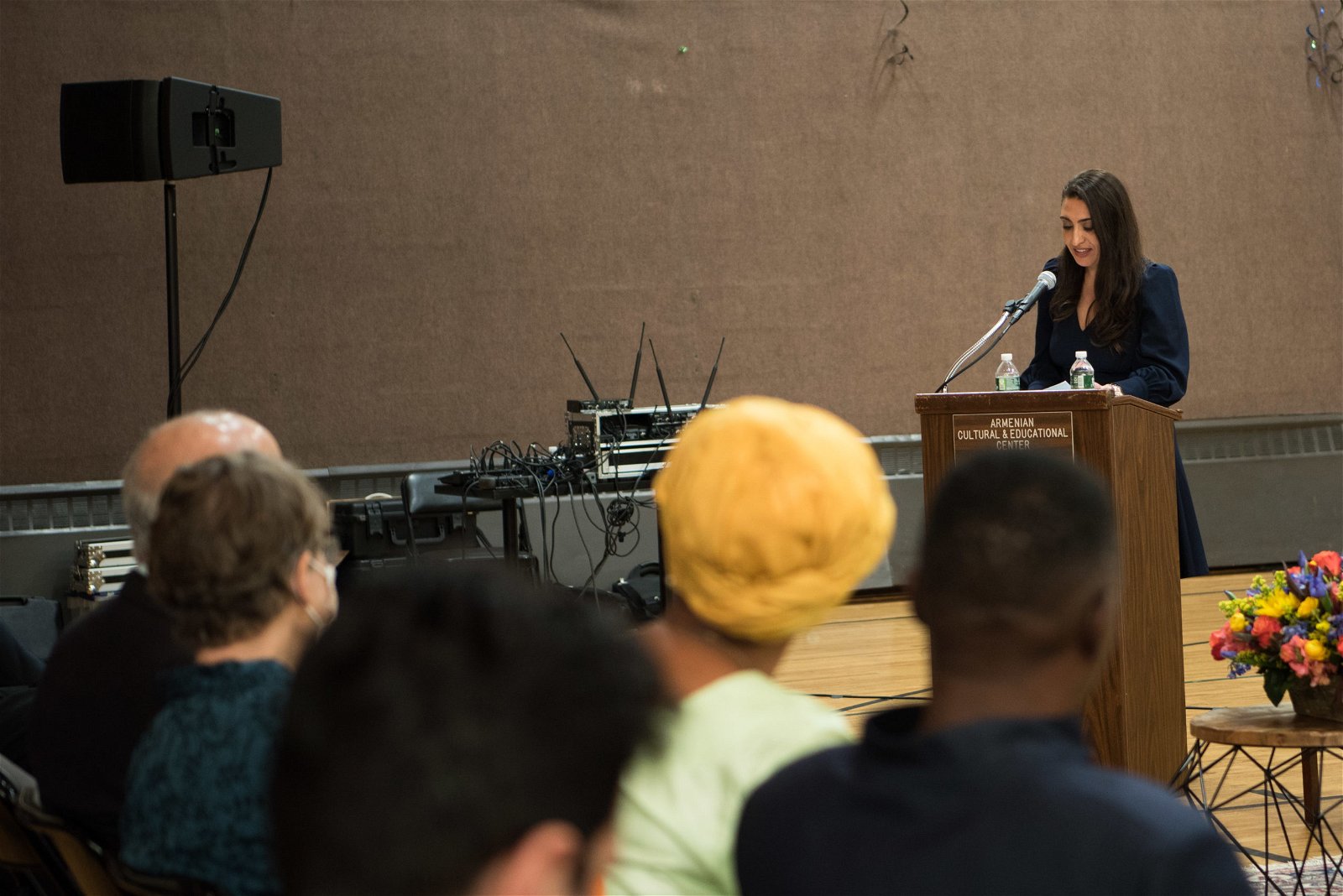WATERTOWN, Mass.—The Armenian National Committee (ANC) of Eastern Massachusetts hosted a commemorative event on Sunday on the occasion of the 107th anniversary of the Armenian Genocide at the Armenian Cultural and Educational Center (ACEC). Entitled “Genocide Education in the 21st Century: Empowering the Next Generation to Lead from Boston to Burundi,” the event featured a panel discussion on the recently passed genocide education bill in the Commonwealth and a keynote address by Ms. Marguerite Barankitse.

As a survivor of the Rwandan Genocide and atrocities in Burundi, Ms. Barankitse – Maggy as she is endearingly called – has made it her mission to help counter the ravaging forces of hatred and indifference in the Great Lakes Region in Africa by establishing Maison Shalom – “a home of peace and love” – in Burundi. By focusing on education and fostering love and trust among children, she has created a model for a transformational society. What began as a home for 25 orphans has now grown to a multi-functional agency helping heal and support more than 30,000 young people and families in Burundi, Rwanda and Congo. For her leadership and innovative approach, Barankitse has been awarded the UNHCR Nansen Refugee Award, the Opus Award and the Aurora Prize for Awakening Humanity, carrying a one-million-dollar monetary prize to support organizations that help people in need.
Historians, politicians and religious leaders have all debated the root causes of this social disease for decades, but atrocities stemming from fear and hatred continue around the world to this day. And while calls for action by way of protests, remembrance events, museums and movies have succeeded in raising awareness to some extent, no government or any other entity has been able or willing to address the issue fully and effectively. This event focused on education as a hopeful remedy for this malaise that has held a lasting grip on humanity. Rooted in her Christian beliefs, Barankitse emphasized the need for love, understanding, hope, compassion and education to transcend humanity beyond political, ethnic, religious and other catalysts that foment hatred, bigotry and subsequent dehumanization of others.
From birth to adolescence, in parallel to the essential physical nourishment, a person makes empirical observations about nature and society, gradually finding one’s place in the world. It is in this vital phase of development that a multi-faceted, interdisciplinary education can play a vital role in shaping the moral character of a person and to instill in one a sense of human dignity, understanding, tolerance and responsibility. Hopeful signs are already emerging. Governor Charles Baker (R-MA) recently signed into law the Genocide Education Bill for public education institutions.

Sunday’s event hosted individuals representing organizations on the frontlines of advocacy for this initiative. Their passion, strong ideals and hard work proved invaluable in achieving this milestone. The panel, moderated by Dr. Lerna Ekmekçioğlu (MIT, Department of History), touched upon the lengthy and challenging process to pass this bill. Eric Cohen of the Massachusetts Coalition to Save Darfur provided details on the coordinated effort to educate the legislature and build consensus toward a comprehensive and actionable bill, with a mandate for all middle schools and high schools in the Commonwealth. Herman Purutyan of the Armenian Assembly of America described his upbringing in Turkey and the absence of any information pertaining to the Armenian Genocide during his formative years. He emphasized the need for coalition building and working with all communities who have suffered from genocide. The panel emphasized the need to universalize man’s inhumanity against man and to take deliberate steps to educate the next generation, to eradicate hatred and genocide as a human condition. The audience engaged with Barankitse and the panelists with a number of thoughtful questions, including one from Lord Ara Darzi of Denham on the psychology of hatred as a key driver of atrocities, and another from Dr. Vazrik Chiloyan on the telltale signs of atrocities that are about to unfold, and the need to recognize and act upon those signs.

The final panelist, Dr. Dikran Kaligian, representing the ANCA, provided details on available resources to educate our educators and arm them with appropriate context, materials and lesson plans to educate our youth through social sciences, history or literature. He discussed the body of work curated by the Genocide Education Project, a national organization devoted to preparing teachers to tackle a challenging and difficult subject in their classrooms.
“Without fully recognizing and investigating the causes of the most destructive chapters in history and how they directly influence current events, today’s students cannot act to prevent such destruction in the future. The Armenian Genocide and its aftermath have a distinctive place in the study of genocide, its stages, and the continuum of comparative genocides that came before and after it. The Armenian Genocide initiated a new era of genocide history, during which the perpetrators used new industrial tools and methods to murder and dispossess record numbers of people more swiftly than ever before, erasing a civilization from its historic homeland, and initiating generations of denial, enabling further destruction.”
The inaugural GenEd Teacher Fellowship Program enables 15 teachers from across the US to train at the Armenian Genocide Museum and Institute (AGMI) for the initial phase of the fellowship this summer. Combining the expertise of the Genocide Education Project with the AGMI’s unique role in Armenian Genocide remembrance and research, this program aims to train social studies and English language arts educators through interactive professional development sessions, guest presentations and visits to historical and cultural sites. The second phase of the fellowship will enable these teachers to host professional development workshops to other educators in their regions to prepare them for their classrooms. These and similar other resources will be invaluable to inform and educate our teachers across the Commonwealth.
Mindful of the fact that those who do not learn from history are doomed to repeat it, we are bound to make every effort to incorporate history and context early in the educational curricula of our children, as we prepare the future leaders of our societies. Everyone is encouraged to reach out to their children’s schools and introduce the new Genocide Education mandate to the social studies, history and/or ELA faculty and share the resources available through the Genocide Education Project to offer training, lesson plans and curricula. As Barankitse has shown us, hope, love and action in the face of adversity are not only indispensable, but form the foundation for every positive change we all strive to take to improve the world in which we live.
In her closing remarks, master of ceremonies Ani Zargarian reflected on the timeless words of the great Persian poet Saadi and the poem “Bani Adam,” which adorns the walls of the United Nations Building in New York City:
Human beings are body parts of each other,
In creation they are indeed of one essence.
If a body part is afflicted with pain,
Other body parts uneasy will remain.
If you have no sympathy for human pain,
The name of human you shall not retain.




Although I respect the intent of the participants, I find these activities to have little value. While we talk about our responsibilities to the world as genocide victims, the world has turned its back on us. What will this do for our cause of justice or for that matter for genocide prevention…sadly very little. Genocide education is a noble concept while Azeris terrorize our lands and Turkey waits lie a vulture. Frankly , I am tired of making the “world” betterwhile we suffer.
I must agree with Stepan.
Armenia is dying and leaderless.
We need some real action.